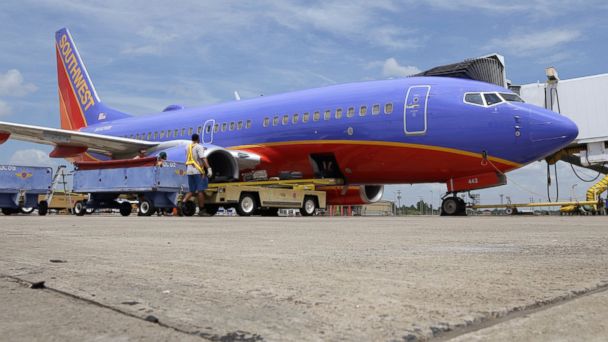Southwest Airlines (LUV) Has 30 Days to Answer Fine

A Southwest Airlines Boeing 737 is pictured being serviced at Bill and Hillary Clinton National Airport in Little Rock, Ark. on June 19, 2014. Danny Johnston/AP Photo
Morning Business Memo:
Southwest Airlines has 30 days to respond to a proposed $12 million civil fine by The Federal Aviation Administration. The penalty is for repair violations on some of Southwest's Boeing 737 jets. Regulators say starting in 2006 Southwest made major alterations to eliminate potential cracking of the aluminum skin on 44 jetliners. A Southwest contractor allegedly failed to follow proper procedures for replacing the fuselage as well as other work on the planes. The airline says the complaint included repairs that were fully resolved years ago.
The airline industry is making more money after several difficult years during the recession. United Airlines, Delta and American Airlines all reported record second quarter profits, thanks to increased fares and fees. Major mergers could mean less competition on many routes, potentially leading to more fare increases as the economy improves. "It is hard to believe that less than eight months ago, American was in bankruptcy yet today we are reporting record profits, prepaying debt, making additional pension contributions and declaring dividends to shareholders," said the company's CEO Doug Parker in a message to employees. Other major U.S. carriers - JetBlue, Alaska Airlines, and Southwest Airlines - also posted impressive earnings for the second quarter," reports The Washington Post.
For many Americans a long distance car trip is a cheaper option than flying. Gas prices are falling pretty quickly across the country. The U.S. Energy Department says the average price of regular gas fell 5 cents a gallon last week to a nationwide average of $3.54. "You know it's something that's relatively rare to see a price decline go this late into the summer months," says senior GasBuddy analyst Patrick DeHaan.
Potholes and lousy road surfaces are a problem for motorists in many states, often leading to expensive repairs. The Senate is scheduled to take up legislation today to keep federal highway money flowing to states, with just three days left before the government plans to start slowing down payments. The House passed a $10.8 billion bill last week that would pay for highway and transit aid through the end of May 2015 if transportation spending is maintained at current levels. But some Senate Democrats who want to force Congress to act on a long-term plan to pay for roads and bridges and are expected to offer amendments. If any of the amendments pass, it would set up an 11th hour showdown between the House and Senate. The Transportation Department says without additional funding it will begin cutting back payments to states this Friday.
A study by the Urban Institute suggests that more than one in three Americans have debts and unpaid bills that have been reported to collection agencies. These consumers fall behind on credit cards or hospital bills. Their mortgages, auto loans or student debt may pile up, unpaid. Even past-due gym membership fees or cellphone contracts can end up with a collection agency, potentially hurting credit scores and job prospects. The Urban Institute says the share of consumers in collections has remained relatively constant, even as credit card debt has declined since 2009.
Richard Davies Business Correspondent ABC News Radio abcnews.com Twitter: daviesnow